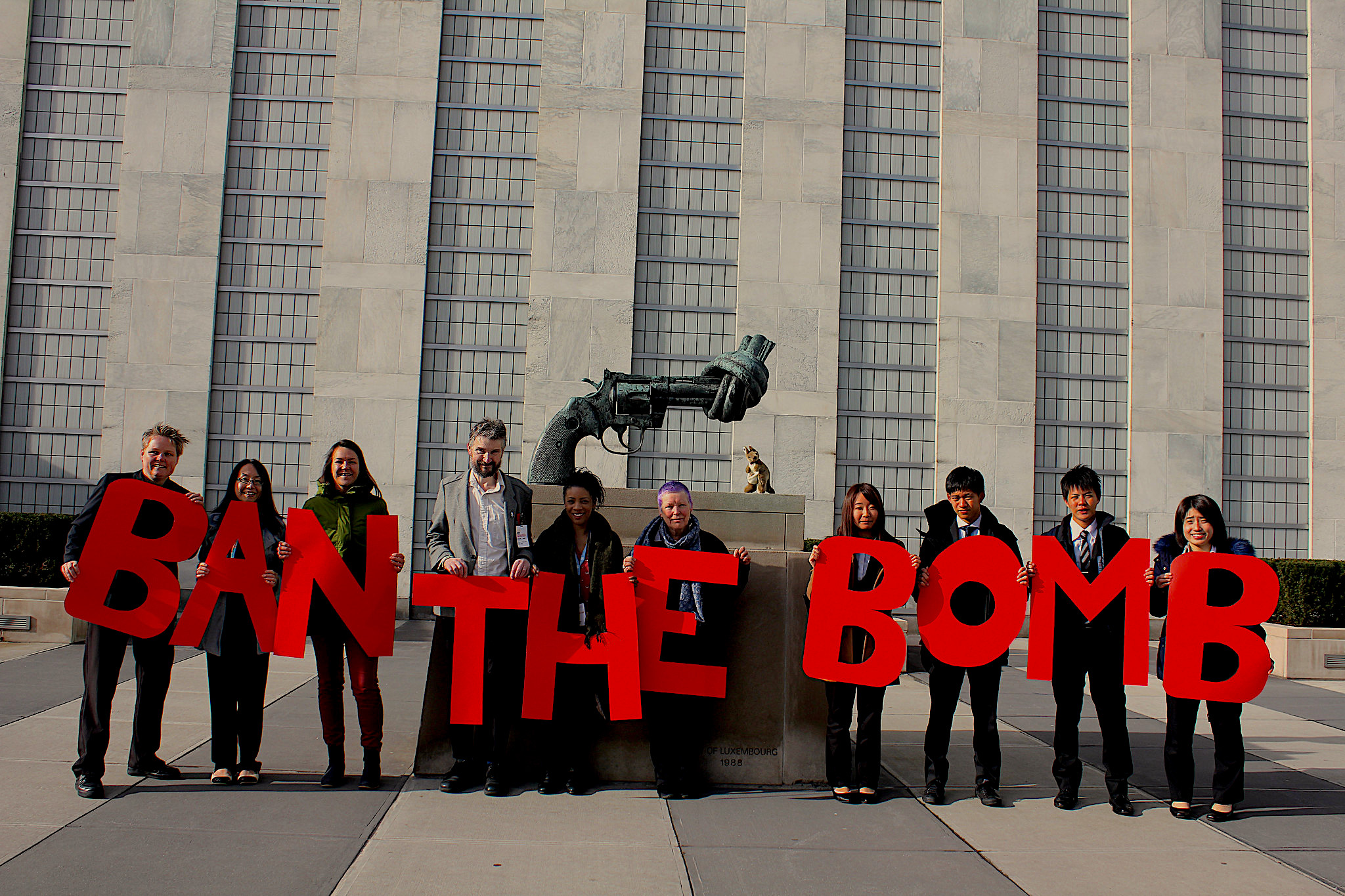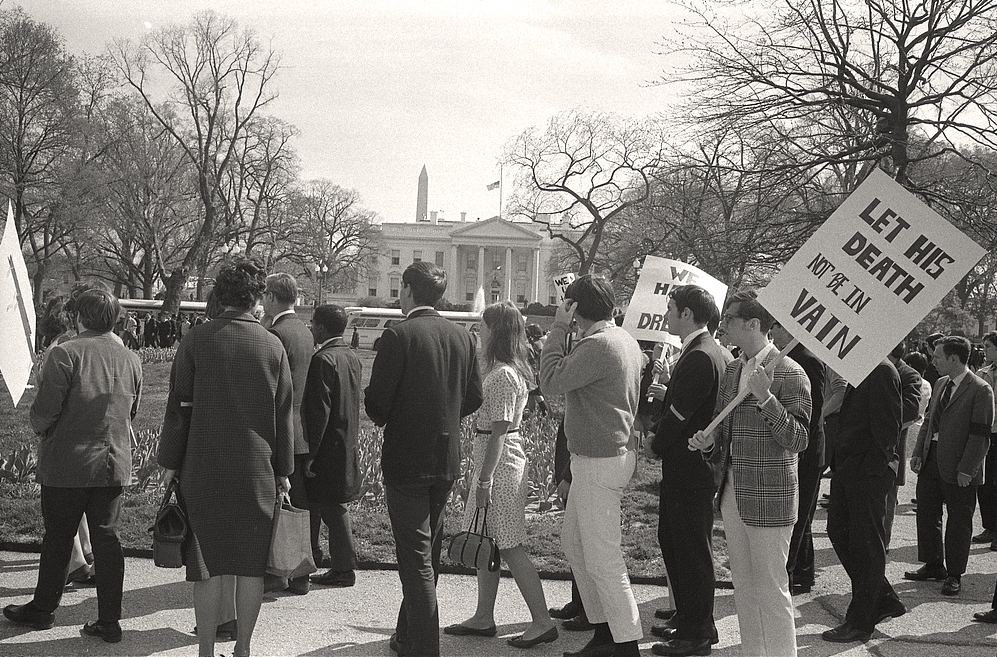Washington could be a leader in the “peace race” advocated by Martin Luther King, says Ann Wright. But only if a loud message is sent to U.S.leaders.

Demonstrators outside UN headquarters in New York, March 31, 2017. (Clare Conboy, ICAN, Flickr)
 As a U.S. Army veteran and a survivor of the nuclear missile attack scare in Hawaii three years ago, I was glad to celebrate on Jan. 22 the coming into force of the new international peace initiative, the UN Treaty on the Prohibition of Nuclear Weapons (TPNW). The nuclear missile attack scare we endured here in Hawaii should compel U.S. citizens to think seriously about joining the worldwide nuclear weapons abolition efforts.
As a U.S. Army veteran and a survivor of the nuclear missile attack scare in Hawaii three years ago, I was glad to celebrate on Jan. 22 the coming into force of the new international peace initiative, the UN Treaty on the Prohibition of Nuclear Weapons (TPNW). The nuclear missile attack scare we endured here in Hawaii should compel U.S. citizens to think seriously about joining the worldwide nuclear weapons abolition efforts.
The “Nuclear Weapons Ban Treaty” as it is also known, was approved by 122 nations in the UN General Assembly in July 2017, a clear expression of the will of the world’s people. Unfortunately, none of the nine nuclear-weapons governments have signed the treaty. That shows the 122 non-nuclear nations that voted for it fear that one or more of the nuclear-armed nations may use these weapons, which could result in a “nuclear winter” and the destruction of the planet.
In November 2020, Honduras became the 50th country to ratify the treaty, the number needed to bring it into effect this month.
In the U.S., powerful and influential corporations will be making billions of dollars from the nuclear programs over the next decade and will be contributing to congressional campaigns to deter the U.S. from approving the he treaty and to continue the mutual-assured-destruction rationale for continuing the nuclear weapons arsenal and their profits.
For its leadership in working to pass the treaty, the International Campaign for the Abolition of Nuclear Weapons (ICAN) was awarded the 2017 Nobel Peace Prize.
Dr. Martin Luther King was awarded the Nobel Peace Prize in December 1964. In his acceptance speech he said:
“Somehow we must transform the dynamics of the world power struggle from the negative nuclear arms race which no one can win, to a positive contest to harness man’s creative genius for the purpose of making peace and prosperity a reality for all of the nations of the world. In short, we must shift the arms race into a… peace race.”

Demonstrators in front of the White House after the assassination of the Rev. Martin Luther King, April 1968. (Library of Congress, Wikimedia Commons)
The Nuclear Weapons Ban Treaty prohibits the development or possession of nuclear weapons and the use or threat to use nuclear weapons. The Treaty on the Prohibition of Nuclear Weapons is a milestone in the long march toward nuclear abolition.
The people of the world have spoken. This is a moment to urge all the nuclear powers to sign the Treaty and begin the process of de-nuclearization. Nowhere is this more important than in the United States, which holds a large portion of the world’s nuclear weapons and maintains a dominant military presence throughout much of the world.
The United States could be a leader in the peace race, but only if U.S. leaders hear a loud message from the people: nuclear weapons are lethal for humanity and they are now illegal.
Ann Wright is a 29-year U.S. Army/Army Reserves veteran who retired as a colonel. As a former U.S. diplomat, she resigned in March 2003 in opposition to the war on Iraq. She served in Nicaragua, Grenada, Somalia, Uzbekistan, Kyrgyzstan, Sierra Leone, Micronesia and Mongolia. In December 2001 she was on the small team that reopened the US embassy in Kabul, Afghanistan. She is the co-author of the book Dissent: Voices of Conscience.
This article first appeared in Star Advertiser and was republished with permission.
The views expressed are solely those of the author and may or may not reflect those of Consortium News.



Using Israel’s annual ritual round of security conferences and political speeches on the anniversary of the 1945 liberation of Auschwitz (transparently cheap attempts to label every issue du jour as an “existential threat”), military Chief of Staff Aviv Kohavi (26-January-2021) and Prime Minister Netanyahu (27-January-2021) parroted the decades-old Israeli claim that Iran is “months, maybe even weeks” from a “bomb”. This year’s hackneyed evidence-free propaganda ploy is accompanied by new post-Trump threats that Israel will unilaterally attack Iran. Israel routinely invokes the specter of a “nuclear arms race in the Middle East” while refusing to surrender its WMD arsenal.
While I am delighted that Col. Ann Wright is a proponant of this Treaty along with other good causes, I am troubled by the seeming ‘carrot’ of the US taking a ‘leadership’ role. It seems to me that it is long past time for the US to simply do the right thing regardless of whether we sit at the head of the table or simply join with others equally. To me, this predilection to think this country must be a leader removes us from many initiatives of great value to humanity.
People with some knowledge of the disease alcoholism understand the decisive point of action made necessary when the alcoholic reaches rock bottom: Intervention. One might compare those unfortunate alcoholics to the remaining nuclear weapons nations in “denial” of their disease, and thus making it necessary for the human family to arrange a world-scale “tough love” intervention to deal with the disease of nuclear weapons possession.
Incomprehensibly dangerous threats require “tough love” measures as well, and an amendment to the much-welcomed Treaty on the Prohibition of Nuclear Weapons making clear illegal possession of nuclear weapons will bring the death penalty – placing only less than a dozen national leaders/human beings at risk instead of potentially billions of innocents – represents the single most effective and powerful, ultimate expression of love for a surviving and thriving humanity.
Peace.
As a dual citizen living in Sweden I hate to inform you that this is no longer the country of Olof Palme and Alva Myrdal.
Without being a formal member Sweden has become a frontline state for NATO. Read the NATO 2030 document and you know
that NATO sabotages the Nuclear Weapons Ban Treaty. There is no hope in the foreseeable future that Sweden will ratify the Treaty.
This instransigence on the part of the Social Democrats and a majority in the parliament proves that they have no respect for the
opinion of the vast majority of Swedes who want to ratify the ban treaty. Since the treaty has come into effect one should call Sweden
for what it is – a rogue state. The Nobel Peace Prize is often awarded to both worthy and unworthy cadidates but violating Albert
Nobel’s original intentions which were inspired by Bertha von Suttner. Ann Wright would be a befitting candidate for the Nobel
Peace Prize. She is a true peacemonger.
Because of the pandemic and the present impasse I would suggest that one support and intensify the ICAN cities appeal campaign.
“a survivor of the nuclear missile attack scare in Hawaii” is a bit much, don’t you think? Given that it was simply a mistake by the state’s Emergency Alert System and Commercial Mobile Alert System, it’s rather excessive to claim survivorship.
Nuclear weapons and nuclear war are a threat to our health. When we emit more than 14.4 pounds of CO2 per day we are contributing to global warming and climate change. Global warming is melting Himalayan glaciers and will eventually decrease water in the Indus River according to climate scientist Lonnie Thompson. India and Pakistan are already having disputes over water, and these disputes will increase as population grows and there is less water in the Indus River. A health care Bill should require health care organizations to require members to fill out an Informed Consent to Contribute to Global Warming and Climate and a possible nuclear war between India and Pakistan every two months. This Informed Consent would remind Americans we need to take all nuclear weapons off hair trigger alert, and work to safely destroy all nuclear weapons.
The Nobel Prize winning International Campaign for the Abolition of Nuclear Weapons (ICAN) website points out that Iran voted in favour of the 2016 UN General Assembly resolution that established the formal mandate for states to commence the negotiations on “a legally binding instrument to prohibit nuclear weapons, leading towards their total elimination”, whereas Israel voted against the resolution.
The ICAN site also notes that Iran both participated in the negotiation of the treaty at the United Nations in New York in 2017 and voted in favour of its adoption, while nuclear-armed Israel did neither.
Does anyone know of a national petition we can sign? Wouldn’t it be lovely if millions in the US signed something like that?
It’ll never happen.
Don’t give up but…what good is any treaty to ban the bomb when so many countries don’t want to honour this commitment.
Extreme double standard:
“U.S. ally and client Israel had from the start received active assistance developing its nuclear capability, and with the help of the United States, France, and Germany, it has built up a substantial arsenal since[…] 150-250 nuclear warheads (the exact number is unknown) plus delivery systems by land, sea, air, and ballistic missile. And throughout more than forty years of such unparalleled help, Israel refused to sign the NPT and subject itself to IAEA inspections and was never pressed to do so.”
– Edward S. Herman and David Peterson, The Iran “Threat” in a Kafkaesque World (2012)
For pro-nuclear weapons advocates, Israel is good and needs to protect itself by threatening mass death on anyone it deems an enemy. Iran is bad and has no right to a defence of any kind. I suspect that’s how Joe Biden sees this.